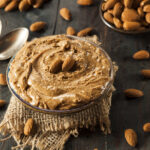Surprising butter NEWS: Elevate your nutrition with these nutty delights
 (NaturalHealth365) Are you accustomed to thinking of butter as an artery-clogging villain? Surprise! It turns out that butter may not be a nutritional culprit after all – and may, in fact, promote health when eaten in moderation. Case in point: butter, especially the grass-fed variety, is rich in vitamin D, anti-inflammatory butyric acid, and conjugated linoleic acid (CLA), which may have anticancer effects. However, butter alternatives made from nuts and seeds can hold their own when it comes to offering health benefits.
(NaturalHealth365) Are you accustomed to thinking of butter as an artery-clogging villain? Surprise! It turns out that butter may not be a nutritional culprit after all – and may, in fact, promote health when eaten in moderation. Case in point: butter, especially the grass-fed variety, is rich in vitamin D, anti-inflammatory butyric acid, and conjugated linoleic acid (CLA), which may have anticancer effects. However, butter alternatives made from nuts and seeds can hold their own when it comes to offering health benefits.
Surprisingly, controlling weight gain is among these benefits. A recent study published in Nutrients found nuts beneficial for weight control and the prevention of long-term weight gain. Another study published in the European Journal of Nutrition revealed that people who consumed higher amounts of nuts gained less weight over five years than those who did not. Let’s check out the surprising virtues of three leading butter alternatives – and see why they give cow’s milk butter a “run for its money” when it comes to supporting health.
From butter to better: Discover almond butter’s nutritional perks
Almond butter features a mellow but delicate flavor. A tablespoon of this nutty spread contains about 100 calories – approximately the same as cow’s milk butter – along with 3.4 grams of protein (substantially more than is found in butter), 1.6 grams of fiber (same story), and 9 grams of heart-healthy mono- and polyunsaturated fats. In addition, a tablespoon of almond butter contains 3.9 mg of vitamin E, which is needed for healthy immune function. (This may sound like a modest quantity, but it constitutes a full 25 percent of the adult recommended daily amount!)
The serving also contains 44.6 mg of magnesium, which helps regulate blood pressure and heartbeat, and 55 mg of calcium, necessary for strong bones. In other good news, a diet rich in tree nuts – particularly almonds – has been associated with reduced risk of heart disease, cancer, and diabetes. Use this butter alternative on pita or whole-grain crackers, feature it as a dip on a raw veggie tray, blend it into your favorite smoothie, or add it to recipes for baked goods.
Hazelnut butter may lower risk of atherosclerosis
With a toasty, nutty, slightly sweet flavor, hazelnut butter is rich in heart-healthy monounsaturated fatty acids. And, like almonds, hazelnuts are high in antioxidant vitamin E. A one-ounce serving (about 20 hazelnuts) contains over 4 grams of beneficial dietary fiber and 4 grams of protein, meaning it offers two important nutrients that butter provides in much smaller amounts – if at all.
According to a study published in Nutrients, a hazelnut-enriched diet was associated with significant decreases in LDL cholesterol and a lower risk of heart disease and atherosclerosis. Finally, hazelnuts are rich in arginine – a heart-friendly amino acid – along with the antioxidant minerals selenium and manganese.
Enjoy this delicious butter alternative in smoothies, or serve it atop oatmeal, yogurt, or fruit. (It pairs particularly well with sliced apples). Or, use this nut milk with a pinch of cinnamon to enhance a cup of coffee.
Sunflower seed butter is chock-full of vitamins and minerals
With one tablespoon containing 100 calories, 8.8 grams of fat (primarily monounsaturated), and 2.8 grams of protein, sunflower seed butter checks many of the “healthy” boxes. In addition, the serving offers up 49.8 mg of magnesium, 16.7 mcg of selenium, 3.7 mg of vitamin E, 0.3 mg of manganese, and 37.9 mcg of folate, a B vitamin believed to help prevent strokes. Another “plus” for sunflower seed butter is that it contains phytosterols that are thought to reduce harmful cholesterol and improve immune response.
Sunflower seed butter has a flavor that is nutty, delicate, and slightly earthy. Spread it on some sliced apples or your favorite vegetable. Celery, bananas, raisins, and carrots are all good partners for this satisfying butter alternative.
It’s easy to make your own butter alternative from scratch
To make hazelnut, almond, or sunflower seed butter, simply place two cups of organic, roasted, skinless, shelled nuts or seeds into a food processor and pulse about 30 times to turn them into crumbs. Process the mixture until it reaches a mealy consistency – usually about a minute. Then, process in one-minute intervals, scraping the sides and allowing the food processor to “rest” for 60 seconds each time. (It can take 10 to 20 minutes of processing and scraping before the mixture is suitably creamy). Transfer to a sterile, airtight glass jar, and refrigerate after cooling. You can “jazz” up these butters with a little sea salt or dates to taste, along with your favorite spice or flavoring, such as cinnamon, cocoa, vanilla, or maple syrup.
Congratulations! You have produced a butter alternative that is not only delicious (and much cheaper than a store-bought variety) but also vegan, low-carb, gluten-free, and appropriate for both ketogenic and “Paleo” diets.
No doubt, while dairy butter has its merits, these wholesome nut butters make a pleasing change of pace. So go ahead, give them a try and enjoy!
Sources for this article include:
NIH.gov
MDPI.com
Link.springer.com
Healthline.com
PlantBasedFAQs.com
MedicalNewsToday.com
DessertsWithBenefits.com
NIH.gov
VeryWellFit.com
Healthline.com
VeryWellFit.com



